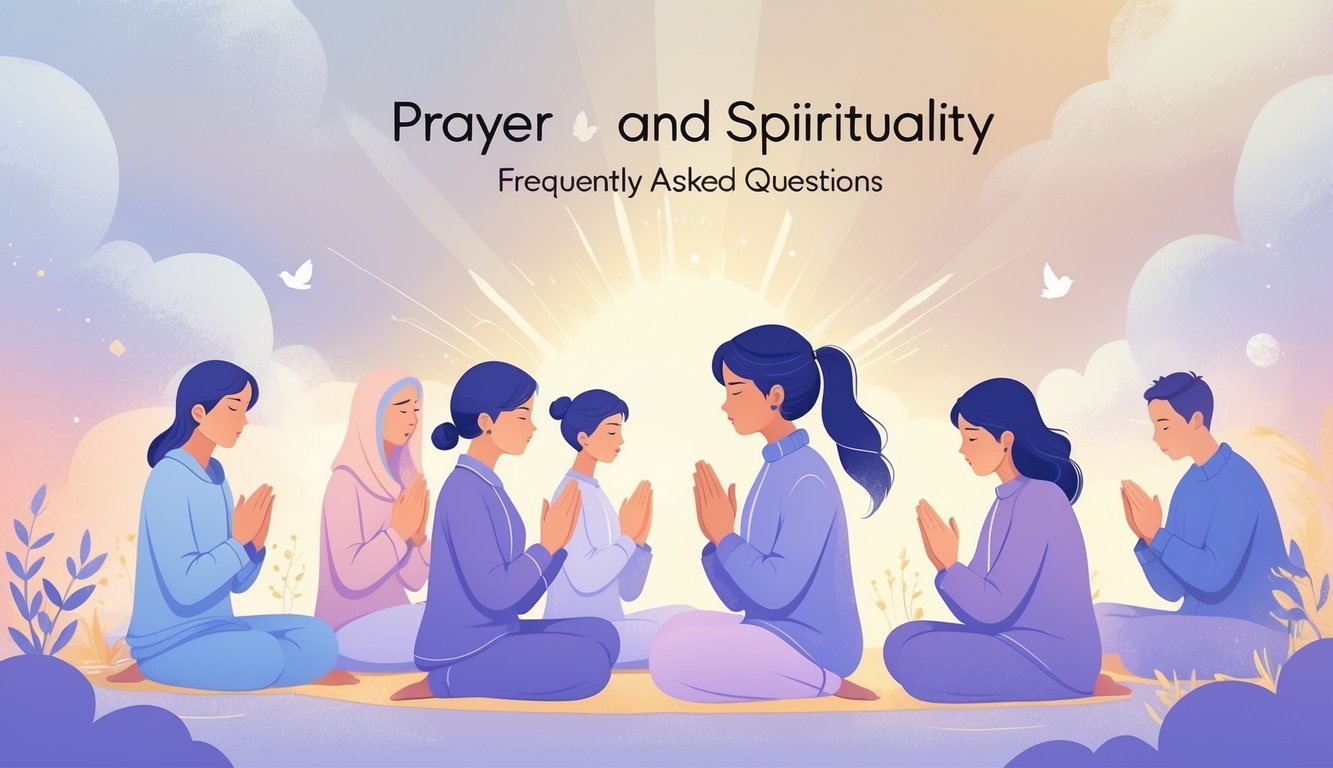Physical Address
304 North Cardinal St.
Dorchester Center, MA 02124
Physical Address
304 North Cardinal St.
Dorchester Center, MA 02124
Prayer connects individuals with their inner selves, fostering spiritual growth, peace, and clarity. Regular practice enhances awareness, builds relationships with the divine, and supports personal transformation.

Prayer really gives you a way to connect with something deeper than yourself.
It’s not just about asking for things—it’s a way to explore your inner self and tap into your spiritual side.
Prayer brings you closer to your true self and can add a sense of peace and clarity to your days.
You don’t need anything fancy to pray, and you can do it wherever you are.
Lots of people say prayer helps them grow spiritually because it makes them more aware of who they are and their place in the world.
Prayer opens up a way to understand and change your reality from the inside out.
Spirituality and prayer work together to bring balance and meaning to daily life.
Are you tired of spinning your wheels and getting nowhere? Simply put, you’re out of sync: you’re out of alignment with your astral configuration.
But: there’s a kind of map that can help you reclaim your alignment. Think of it as your own personal blueprint to success and happiness: a blueprint that will help you live your most amazing life.
Get started here.
If you make prayer a habit, it can guide your actions and connect you with a bigger purpose.

Prayer helps you connect with your inner self and the spiritual world.
It’s more than just saying words; it’s about surrender, growth, and looking for guidance.
You might discover how the Holy Spirit guides you and why spiritual growth matters so much in your prayer life.
Prayer is how you talk to a higher power, often God.
You might ask, give thanks, or just share your thoughts.
This act shows your spiritual need and trust.
Spirituality is a bigger experience—it’s about connecting with something beyond yourself, your values, beliefs, and how you find meaning.
Prayer isn’t only about asking.
Sometimes it’s listening, feeling peace, or asking for help to find your path.
The Holy Spirit guides you when you pray.
It helps you move past just your own thoughts, giving you deeper insight.
If you surrender to the Spirit, you open yourself to wisdom and comfort you might not reach alone.
You could think of the Holy Spirit as a helper, leading you toward what’s true and good in your life.
Spiritual growth means building your relationship with the divine and learning more about yourself.
Prayer helps you learn patience, trust, and humility.
Growth often comes through challenges, and faith helps you become stronger inside.
As you grow spiritually, your prayers might shift—less asking, more listening and understanding.

Growing your prayer life takes some time and intention.
You’ll focus on connecting more with God, trying different ways to pray, building daily habits, and letting Scripture guide you.
Your prayer life grows when you treat prayer like talking with a friend.
Be honest, open, and try to be consistent.
You don’t need special words or a perfect attitude—just a real desire to know God better.
Spend quiet moments listening, not just speaking.
This helps you notice God’s presence.
Over time, prayer can shift from asking for things to just wanting to be close.
Trust builds as you bring everything—worries, hopes, and thanks—to God.
This ongoing conversation brings more faith and peace.
Prayer comes in different forms, each with a unique purpose.
Adoration: Focus on God’s greatness and love. Praising helps you feel closer to God.
Thanksgiving: Thank God for daily things and blessings. Gratitude brings joy.
Confession: Admit your mistakes and ask for forgiveness. This clears your heart and gives you a fresh start.
Intercession: Pray for others. It shows love and builds community.
Mixing these types into your routine keeps your prayer life balanced and real.
To grow spiritually, set aside a bit of time each day for prayer.
Even a few minutes matter more than how long you pray.
You can write prayers in a journal or keep a list to remember people and needs.
This keeps you focused.
Add in some silence to listen and reflect.
Daily prayer helps you build patience, peace, and steady faith.
Little habits like these make your spiritual maturity grow over time.
Using Scripture in prayer connects you to God’s wisdom and promises.
Read a verse before you pray or use scripture-based prayers to focus your mind.
Scripture shapes your requests and helps you see more of God’s character.
It can bring comfort, especially when you’re not sure what to say.
While you pray with Scripture, you might notice new insights or feelings.
These moments deepen your faith and help you grow.
Praying with God’s Word makes your prayer life stronger and more meaningful.

Prayer includes habits and actions that can help you grow spiritually.
Building a steady routine and seeing how prayer affects your mind and soul both matter.
Spiritual disciplines tied to prayer include meditation, fasting, and reading sacred texts.
These practices help focus your mind and keep your heart open during prayer.
You might also try journaling your prayers or spending quiet time in nature to strengthen your faith.
Pick a specific time each day for prayer.
Making it a habit helps you stick with it.
Set reminders or link prayer to daily routines, like after meals or before bed, to keep it going.
Prayer can reduce stress and bring peace.
It often helps you feel connected to something bigger.
Regular prayer might also sharpen your focus and guide you to make better choices.
Yes, spirituality doesn’t always need prayer.
Some people find spirituality through actions, art, or just quiet reflection.
Prayer is one way to explore spirituality, but definitely not the only way.
Try being honest and open in your prayers to deepen your connection.
Speak from the heart and don’t stress about the right words.
Sitting in silence after you pray can help you feel more connected and aware of any spiritual guidance that might come your way.
Try to focus completely on your prayer—distractions happen, but do your best to set them aside.
Simple, clear words usually help you stay present.
Patience and persistence make a real difference.
You don’t need to use a lot of words or stick to rigid routines.